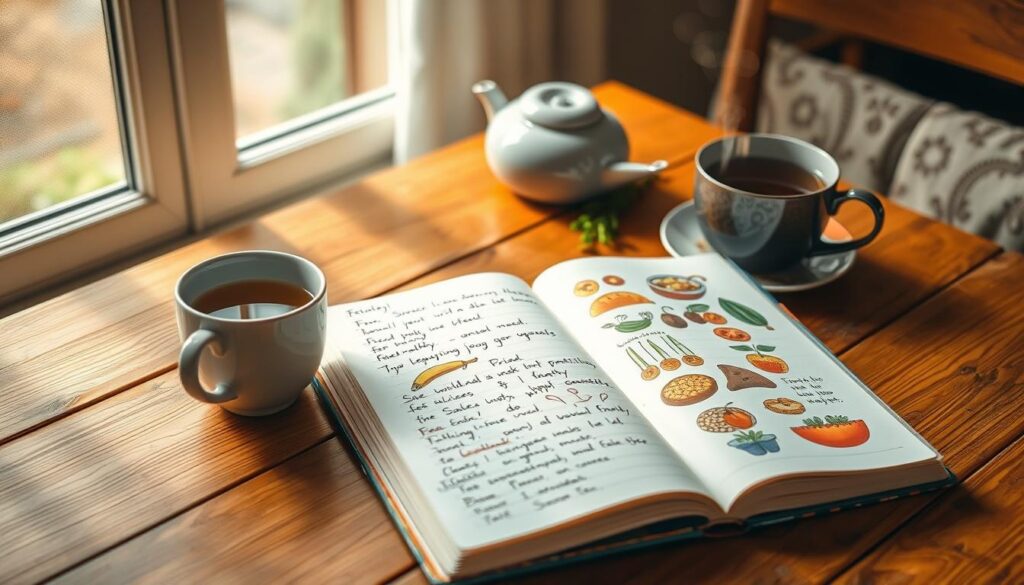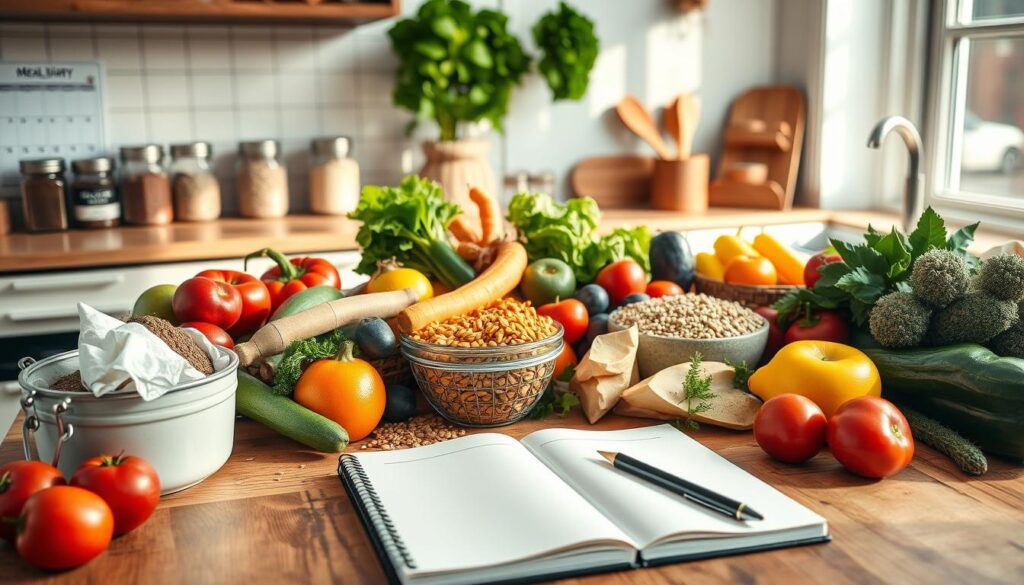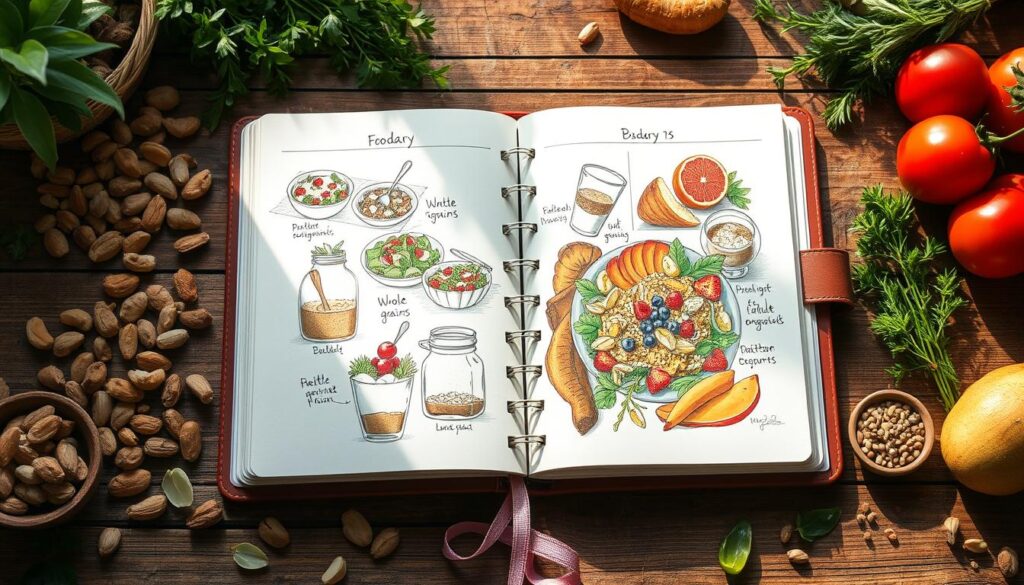Feeling like your eating habits are out of control? Want to know what you eat every day and how it affects you? A food diary can help! It lets you track your meals, snacks, and drinks. This way, you’ll gain insights that change how you see food and improve your health.
Key Takeaways
- Discover the remarkable benefits of keeping a detailed food diary
- Understand the science behind the impact of meal documentation on dietary awareness
- Learn essential tips for effective meal tracking, from portion size to mood notes
- Explore digital tools and apps that make nutrition logging a breeze
- Leverage your food diary to achieve your weight management goals
Imagine eating with purpose, knowing you’re feeding your body well. A food diary is your key to a better food relationship. Start this journey to discover yourself and find lasting wellness. Are you ready to manage your eating habits and feel great?
Understanding the Power of Food Diary Tracking
Keeping a detailed food diary can change your life. It helps you reach your health and wellness goals. Whether you want to lose weight, manage a health condition, or eat more mindfully, it’s key.
Benefits of Regular Meal Documentation
Recording what you eat helps you understand your habits. This calorie tracking and diet journal knowledge lets you spot patterns. It helps you make better food choices and control your portions.
Over time, this mindful eating can lead to lasting changes. You’ll see improvements in your health.
Scientific Evidence Behind Food Journaling
Many studies show food journaling helps with weight loss. A study in the Journal of the Academy of Nutrition and Dietetics found it doubles weight loss. Another study found it helps reach and keep dietary goals.
Impact on Dietary Awareness
Keeping a diet journal does more than track calories. It makes you more aware of your eating. You learn to listen to your body’s hunger and fullness signals.

Keeping a food diary is one of the most powerful tools for achieving sustainable weight loss and improving overall health.
Starting a food diary can be a big step towards a healthier life. It gives you insights to reach your calorie tracking, diet journal, and mindful eating goals.
Getting Started with Your Food Diary
Starting your meal planning and weight management journey is exciting. The key to success is a personalized food diary. You can use a notebook or a digital tool. We’ll show you how to make tracking meals easy.
First, pick the method that suits you best. Some like writing in a notebook, while others prefer apps. The most important thing is to be consistent. Record your meals, snacks, and drinks as you go.
- Choose a journal or notebook with lots of space for notes.
- Look for meal tracking apps that work on all your devices.
Next, decide how detailed you want your diary to be. Some like a quick summary, while others want to list every ingredient. Find what works best for you and your goals.
“The act of writing down what you eat can be a powerful tool for self-awareness and behavior change.”
Your food diary is a personal journey. Be open-minded and adjust as needed. It’s about understanding your eating habits and making better choices for your health.

Are you ready to start your meal planning and weight management journey? Grab your journal or open your app. Let’s begin your path to a healthier you.
Essential Components of Effective Meal Tracking
Recording your daily meals is key to better nutrition and health goals. To make your food diary effective, focus on three main areas. These are portion size, timing, and mood and hunger notes.
Portion Size Documentation
Measuring food portions can be tricky. But it’s crucial for tracking nutrition. Use measuring cups, spoons, or your hand to record food amounts. This detail helps you understand your daily calories and improve portion control.
Timing and Frequency Records
Tracking when and how often you eat is important. Note the time of each meal and snack. This helps spot areas for improvement, like regular eating to keep blood sugar stable.
Mood and Hunger Level Notes
Your mood and hunger can affect food choices. Write down your mood and hunger before and after meals. This shows patterns and helps understand why you eat certain things.
By recording these key points, you’ll get a detailed food diary. This diary offers insights into your eating habits. Use this info to make better choices and develop healthier habits over time.
| Meal Tracking Component | Benefits |
|---|---|
| Portion Size Documentation | Accurate caloric intake, improved portion control |
| Timing and Frequency Records | Identification of eating patterns, blood sugar regulation |
| Mood and Hunger Level Notes | Insights into emotional drivers of eating habits |
Digital Tools and Apps for Nutrition Logging
In today’s digital age, tracking your calorie intake is easier than ever. Many user-friendly apps and tools help you log your nutrition. They make it simple to keep track of your health goals.
MyFitnessPal is a top choice for calorie tracking. It lets you log your meals and track macronutrients. You can even scan barcodes to log packaged food info. With a huge food database and customizable targets, MyFitnessPal makes tracking calories easy.
LoseIt is another great app. It tracks your diet and offers meal and workout plans. Cronometer is perfect for those who like visuals. It shows nutritional breakdowns and charts to track your progress.
| App | Key Features | Platforms |
|---|---|---|
| MyFitnessPal | – Comprehensive food database – Barcode scanning – Macronutrient tracking |
iOS, Android |
| LoseIt | – Personalized meal plans – Workout recommendations – Progress tracking |
iOS, Android |
| Cronometer | – Detailed nutritional analysis – Visually engaging graphs – Comprehensive food database |
iOS, Android, Web |
These digital tools and apps make logging your diet and tracking calories simple. They help you stay on track with your health goals. Use technology to support your healthy lifestyle and reach new wellness levels.
Making the Most of Food Scan Genius App
Tracking your food has never been simpler with the Food Scan Genius app! This tool gives you quick access to nutrition info. It helps you make better food choices and keep a detailed food diary.
Barcode Scanning Features
Scanning barcodes is now super easy. The Food Scan Genius app lets you quickly find nutritional data for many foods. Just scan the barcode, and you’ll get calories, macros, and more in your food diary. Say goodbye to label guessing and portion confusion.
Allergen Detection Capabilities
Managing your diet is easy with the app’s allergen detection. Scan a product, and it flags any allergens. This helps you avoid bad reactions and stick to your diet.
Nutritional Analysis Tools
Explore your meal’s nutritional details with the app’s tools. It tracks calories and macronutrients to help you reach your health goals. Whether you’re trying to lose weight, build muscle, or stay balanced, the app supports you.
The Food Scan Genius app is perfect for your food diary and nutrition logging. Its barcode scanning, allergen detection, and analysis features are invaluable. Start using it today to take charge of your diet!
Building Healthy Eating Habits Through Documentation
Ready to change how you think about food? Your food diary might be the answer. It’s a powerful tool for mindful eating and reaching your wellness goals.
Writing down what you eat gives you insight into your habits. You might find you snack on junk when stressed or don’t eat enough veggies. Your journal can help you change these habits for the better.
- Start with small, achievable goals. Use your diary to track changes like drinking more water or eating less processed food. Celebrate every small win!
- Try new recipes with healthy ingredients. It’s a fun way to add color and flavor to your meals while nourishing your body.
- Pay attention to how you feel before and after eating. This helps you listen to your body and make better food choices.
Changing your eating habits takes time and effort. But with your food diary, you’re on the right path. Enjoy the journey and let your diary guide you to lasting, healthy eating habits.
| Benefit | Description |
|---|---|
| Increased Awareness | Keeping a food diary helps you become more mindful of your eating habits, allowing you to identify patterns and areas for improvement. |
| Goal Setting | Your food journal provides valuable data to set realistic, achievable goals and track your progress towards a healthier lifestyle. |
| Behavior Modification | The act of documenting your meals can encourage you to make more conscious, mindful eating choices throughout the day. |
Maximizing Weight Management with Daily Records
Keeping a detailed food diary can change your weight management game. It helps you track your daily calories in and out. This way, you can make better choices about what you eat and how much you move.
Caloric Balance Tracking
Understanding calorie balance is key to managing your weight. Your food diary lets you log every meal and drink. This shows your daily calorie count. Plus, tracking your activity helps you see how many calories you burn.
Progress Monitoring Methods
- Regular weigh-ins: Weigh yourself at the same time each day or week to track your weight fluctuations.
- Body measurements: Document changes in your waist, hips, and other key measurements to gauge your progress.
- Clothing fit: Pay attention to how your clothes fit and feel over time as an indicator of your body’s transformation.
Goal Setting Strategies
Setting realistic goals is vital for keeping weight off. Your diary helps pinpoint areas to work on, like eating smaller portions or more veggies. Regularly checking your diary lets you tweak your goals and plans to stay on course.
| Metric | Current | Goal |
|---|---|---|
| Weight | 175 lbs | 160 lbs |
| Waist Circumference | 36 inches | 34 inches |
| Daily Calorie Intake | 2,500 calories | 2,000 calories |
Using your food diary wisely can help you manage your weight effectively. Stay consistent with your records, and you’ll see your progress grow.
Common Mistakes to Avoid in Food Journaling
Keeping a diet journal or nutrition logging can help you reach your health goals. But, even the most careful journalers can make mistakes. Knowing these errors can keep your diet journal useful and helpful.
One big mistake is not accurately recording how much food you eat. It’s easy to guess wrong, which can mess up your data. To fix this, use measuring cups and spoons to log your food exactly.
- Accurately document portion sizes for a more reliable diet journal.
- Use measuring tools to ensure precise nutritional tracking.
- Don’t rely on guesswork when logging your meals and snacks.
Another mistake is not logging your food consistently. Missing entries or forgetting meals can make your data incomplete. Try to log your food every day, even when it’s busy or you’re eating out.
| Habit | Impact |
|---|---|
| Consistent diet journal entries | Provides a comprehensive record for analysis |
| Sporadic nutrition logging | Incomplete data leads to skewed insights |
By avoiding these mistakes, you can make your food diary more useful. Stay dedicated, and your diet journal will help you live a healthier life.
Conclusion
Your food diary journey has been a game-changer. By tracking your meals, you’ve learned a lot about your eating habits. Every small step towards a healthier life matters.
Food journaling changes how you see food. It makes you notice what you eat, how much, and why. This knowledge helps you make better choices.
Keep up with your food diary, and see big changes. You’ll feel more energetic, manage your weight better, and feel happier. Celebrate your wins and keep going on your journey to a healthier you.
FAQ
What is a food diary and how can it benefit my health?
A food diary is a record of what you eat and drink every day. It helps you understand your eating habits. This can lead to healthier choices and better overall health.
What are the key benefits of regularly documenting my meals?
Keeping a food diary increases your awareness of eating habits. It helps with portion control and nutrient intake. It also makes you more mindful of what you eat.
How do I get started with a food diary?
Starting a food diary is simple. You can use a notebook, a digital app, or a spreadsheet. Just remember to write down everything you eat and drink, along with how much and when.
What information should I include in my food diary?
Your food diary should note the food or drink, the time, and how hungry or full you were. Also, include any feelings or activities related to the meal.
Are there any digital tools or apps that can make food journaling easier?
Yes, many apps and tools can help with food tracking. They include calorie counters, barcode scanners, and apps for meal planning and analysis.
How can a food diary help me with weight management?
A food diary is great for managing weight. It helps you track calories and find ways to improve your diet. By monitoring your progress, you can set and achieve realistic goals for your eating habits.
What are some common mistakes to avoid when keeping a food diary?
Don’t forget to record snacks and drinks, and try to accurately measure portions. Also, remember to note your mood and hunger levels. Being consistent and detailed is crucial for a successful food diary.





